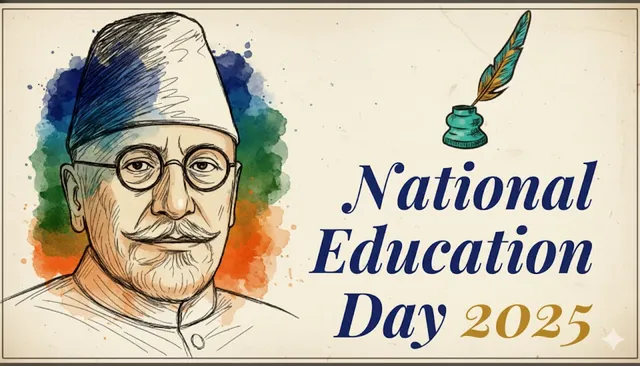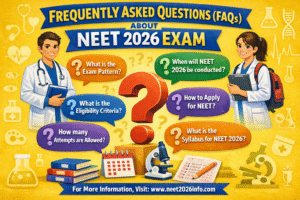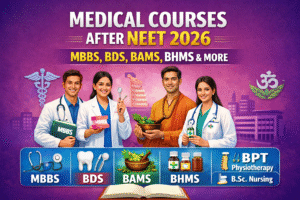1.Introduction
National Education Day is celebrated annually on November 11 across India.
The day commemorates the birth anniversary of Maulana Abul Kalam Azad (1888–1958) — India’s first Minister of Education and a key architect of the modern Indian education system.
The celebration recognises his lifelong contributions toward nation-building through education and his belief that knowledge must be universally accessible.
2. Historical Background
Maulana Abul Kalam Azad was born on 11 November 1888 in Mecca, Saudi Arabia.
He was a freedom fighter, journalist, theologian, scholar, and reformer who played a crucial role in the Indian independence movement.
After Independence, he served as India’s first Education Minister (1947–1958) in Pandit Jawaharlal Nehru’s Cabinet.
Under his leadership, India began laying the foundation of its modern education system.
3. Vision and Philosophy of Maulana Azad
Believed that education is the foundation of nation-building.
Advocated for universal primary education and free, compulsory schooling for all children up to the age of 14.
Emphasised scientific and technical education to modernise India.
Stressed the role of education in promoting:
Critical thinking
Confidence and character building
Civic responsibility and moral values
National integration and communal harmony
His approach aimed to make education not just academic but transformative and socially meaningful.
4. Major Institutional Contributions
Maulana Azad laid the groundwork for several premier educational and research institutions in post-independence India:
🏛️ Indian Institutes of Technology (IITs) – Promoted world-class technical education.
🎓 University Grants Commission (UGC) – For coordination and quality standards in higher education.
🔬 Council of Scientific and Industrial Research (CSIR) – To strengthen scientific research and innovation.
📚 Indian Institute of Science (IISc) and Indian Council for Cultural Relations (ICCR) also received strong institutional support under his vision.
He also prioritised adult education, women’s education, and vocational training.
5. Declaration of National Education Day
In 2008, the Ministry of Human Resource Development (now Ministry of Education) officially declared November 11 as National Education Day.
The day is observed annually to commemorate Maulana Azad’s legacy and to raise awareness about the importance of education in national development.
6. Objectives of National Education Day
To honour Maulana Azad’s contribution to education and nation-building.
To promote awareness among people about the role of education in progress and equality.
To encourage inclusive, equitable, and quality education for all sections of society.
To emphasise that education extends beyond classrooms and includes civic responsibility and moral values.
7. Observance and Activities
Educational institutions and organisations across India celebrate the day through:
Seminars, webinars, and workshops on education and nation-building.
Essay writing, quiz, and poster-making competitions on themes related to education and Maulana Azad’s ideals.
Public awareness campaigns, such as by Punjab Police this year, integrating social themes like traffic safety, discipline, and civic awareness.
Community outreach highlighting that education must foster responsible citizenship and social consciousness.
8. Maulana Azad’s Legacy and Continuing Relevance
His ideas continue to inspire India’s education policy framework, including:
Right to Education (RTE) Act, 2009
National Education Policy (NEP) 2020 – which also emphasises inclusivity, flexibility, and holistic learning.
His emphasis on scientific temper, cultural understanding, and moral development remains highly relevant for a 21st-century knowledge-based society.
Institutions like Maulana Azad National Urdu University (MANUU) and Maulana Azad Education Foundation (MAEF) carry forward his mission for inclusive education.
9. Exam-Oriented Key Facts
| Aspect | Details |
|---|---|
| Event | National Education Day |
| Date | November 11 |
| Honours | Birth anniversary of Maulana Abul Kalam Azad |
| First Observed | 2008 |
| Declared By | Ministry of Human Resource Development (now Ministry of Education) |
| Position Held by Azad | India’s first Minister of Education (1947–1958) |
| Major Institutions Established | IITs, UGC, CSIR |
| Vision | Universal access to education, scientific learning, and social responsibility |
10. Relevance for UPSC
Static GK: National days, education policy, and institutions (IITs, UGC).
Modern History: Freedom movement and Azad’s contribution to nation-building.
Governance & Polity: Educational reforms, NEP 2020, and public institutions.
Essay/GS Paper II: Role of education in social transformation and inclusive growth.
11. Conclusion
National Education Day is not merely a commemoration of Maulana Azad’s birth but a reminder of the transformative power of education. His legacy encourages India to pursue a path where learning is inclusive, accessible, and empowering, enabling every citizen to contribute to a progressive and enlightened nation.







